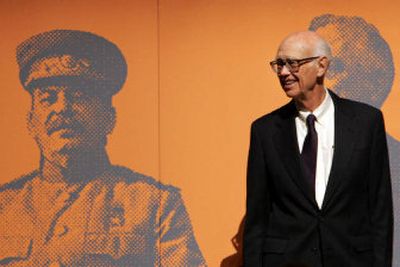Grandsons of World War II leaders rehash Yalta

MAASTRICHT, Netherlands – The grandsons of World War II leaders Franklin Roosevelt, Winston Churchill and Josef Stalin debated the merits of the Yalta conference Saturday, 60 years after the critical wartime summit that drew borders for the division of Europe and the Cold War.
The three grandsons, now elderly themselves, laughed often during their first meeting ever. And unlike their famous forebears, even the arguments were good-humored.
“My grandfather had the highest regard for your grandfather as a wartime leader,” British author and politician Winston S. Churchill told Yevgeny Dzhugashvili, Stalin’s grandson, a retired colonel and military historian.
Dzhugashvili said he felt “honored” to be Stalin’s grandson, despite Stalin’s reputation in the West as a murderous despot. “They say he did this and that. But he did everything to develop Russia,” the grandson said.
Dzhugashvili said the three grandfathers were friendly during the famous wartime summit at the Ukainian resort from Feb. 4-11, but he said Stalin viewed the United States and Britain as implacable enemies.
“They didn’t have allies, only colonial interests,” he said. “Danger united them. As soon as the war was over, Churchill wanted to start a war against the Soviet Union.”
The three grandsons differed sharply about the war and what happened at Yalta.
Some historians have criticized the meeting of the “Big Three” at Yalta that led to Soviet domination of eastern Europe for decades.
The Yalta conference took place as Stalin’s army was poised for the final attack on Berlin after occupying Poland. Stalin had the largest army in Europe, 12 million soldiers in 300 divisions. Eisenhower’s 4 million men in 85 divisions were still west of the Rhine.
“Nobody got what they wanted from Yalta except the Russians, who were in a position to get it,” Curtis Roosevelt, an educator and former United Nations diplomat, said during the meeting of the grandsons at the University of Maastricht in the Netherlands.
Roosevelt’s grandson said the decisions made at Yalta were mostly about accepting reality after the United States’ late entry into the war. Russia entered the war in June 1941 after Nazi Germany invaded; the United States began the fight in Europe after Japan attacked Pearl Harbor on Dec. 7, 1941.
Churchill’s grandson agreed that Russia got the most out of Yalta. “Possession is nine-tenths of the law. Marshal Stalin possessed half of Europe by the time of the meeting, and there was nothing (Churchill and Roosevelt) could do about that.”
Dzhugashvili said the divisions made at Yalta were fair because of the sacrifices by the Soviet Union in defeating Germany. Russia’s wartime losses were in the millions. He added that not all the conference’s decisions were military.